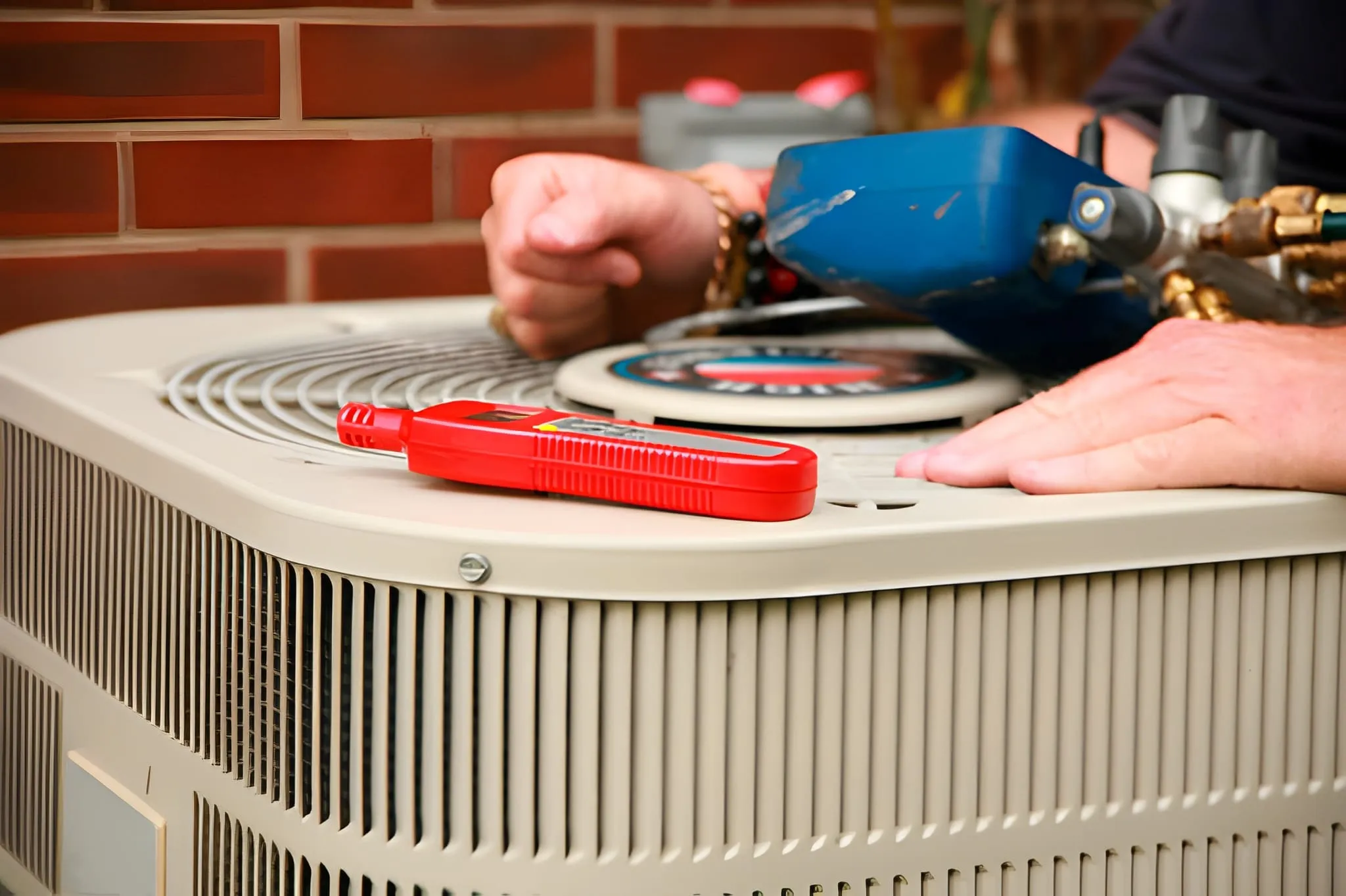AC Service in Weston, KS
AC service in Weston, KS focuses on routine maintenance and diagnostics to keep cooling systems reliable through hot summers, humid air, and seasonal storms. The page outlines common issues such as weak cooling, poor airflow, and refrigerant concerns, and explains services from inspections and tune-ups to refrigerant checks, airflow testing, and electrical diagnostics. A transparent scheduling process, clear findings, and prioritized repairs help homeowners plan around peak demand, improve efficiency, and prevent costly mid-season failures.
AC Service in Weston, KS
Keeping your air conditioner running reliably through Weston summers is about more than comfort — it protects your home, lowers energy bills, and prevents emergency breakdowns when temperatures and humidity peak. AC Service in Weston, KS focuses on routine maintenance and targeted diagnostics to identify small problems before they become costly failures, accounting for local conditions like hot, humid summers, spring pollen, and seasonal storms that stress outdoor equipment.
Why routine AC service matters in Weston, KS
- High humidity and heat: Weston experiences warm, humid summers that push systems to work harder and amplify the impact of any loss in efficiency.
- Pollen and dust: Spring pollen and dust can clog filters and coils faster than in drier climates, reducing airflow and indoor comfort.
- Storms and corrosion risk: Periodic storms and proximity to river valleys increase the chance of debris, water exposure, and corrosion on outdoor units.Routine service preserves capacity, improves dehumidification, and reduces the likelihood of mid-summer failures.
Common AC Service issues in Weston, KS
Homeowners in Weston typically call for service for these problems:
- Weak or inconsistent cooling (often from low refrigerant, airflow restrictions, or failing compressors)
- Poor airflow or weak vents (dirty filters, blocked ducts, blower motor issues)
- High energy bills despite normal thermostat settings (inefficient components, dirty coils, or refrigerant problems)
- Short cycling or frequent on/off cycles (electrical issues, oversized systems, or thermostat faults)
- Ice on the evaporator coil (restricted airflow or refrigerant imbalance)
- Strange noises from the outdoor unit (bearing wear, loose parts, or failing fan motors)
- Water leaks or clogged condensate drains (blocked drain lines or improper slope)
Types of AC service provided
- Routine inspection and tune-up: Comprehensive system check to keep equipment performing at rated capacity.
- Performance testing: Measure temperature split, operating pressures, and electrical draw to identify inefficiencies.
- Refrigerant checks and leak detection: Verify charge levels and inspect for leaks using industry-standard methods.
- Airflow diagnostics: Static pressure checks, return/ supply restrictions, and duct leak assessment.
- Electrical diagnostics: Check capacitors, contactors, breakers, and control wiring for signs of wear or failure.
- Filter and coil cleaning: Evaporator and condenser coil cleaning plus filter replacement recommendations to restore heat transfer.
- Condensate system service: Clear drain lines, inspect pans, and install or recommend safety switches if needed.
- Component repair recommendations: Transparent explanations of needed parts (capacitors, fan motors, compressors, thermostats) and expected outcomes.
What a standard diagnostic service includes
- Visual inspection of indoor and outdoor units for obvious damage, corrosion, or debris.
- Replace or inspect the air filter and note recommendations for filter type and replacement frequency based on home use and local pollen levels.
- Measure supply and return air temperatures and calculate the system’s temperature split to gauge cooling effectiveness.
- Test refrigerant pressures to verify proper charge and look for signs of leaks.
- Evaluate airflow and static pressure to identify duct or blower issues that reduce capacity.
- Inspect electrical components: breakers, fuses, capacitors, contactors, and control board diagnostics.
- Clean accessible coils and the outdoor unit’s fins where needed, and remove vegetation or debris around the condenser.
- Check condensate drain function and safety features to prevent water damage.
- Provide a clear written summary of findings, prioritized repair recommendations, and an estimated timeline for repairs or upgrades.
Typical repairs and solutions explained
- Refrigerant leaks and recharge: Modern systems must be charged to exact specifications. Technicians locate leaks, repair or replace defective components, and restore the correct refrigerant charge to recover cooling efficiency.
- Capacitor and motor replacements: Capacitors weaken over time and cause slow starts or failure of fan and compressor motors. Replacing these restores reliable operation and prevents secondary damage.
- Compressor diagnosis and replacement: Compressors that fail or run inefficiently require careful diagnosis. When replacement is necessary, technicians will explain the options and the long-term reliability implications.
- Duct sealing and balancing: Leaky ducts and poor airflow reduce cooling and increase runtime. Sealing leaks and balancing the system restores even temperatures and reduces energy use.
- Thermostat calibration or replacement: Inaccurate thermostats cause cycling and comfort issues. Upgrading to a programmable or smart thermostat can improve efficiency and humidity control.
- Coil and condenser cleaning: Dirty coils reduce heat transfer causing higher run times. Deep cleaning improves capacity and can restore efficiency lost to buildup.
Transparent scheduling and service process
AC service in Weston, KS is structured to minimize disruption and to communicate findings clearly:
- Appointments are scheduled with a defined arrival window and documented inspection checklist.
- Technicians perform diagnostics and leave a written service summary that explains problems, recommended repairs, and the expected benefits of each option.
- Repairs are prioritized by safety and risk of failure during high-load periods. Estimates for recommended work include expected timelines for parts and labor.This approach helps you plan service around the seasonal demands typical in Weston, KS without surprises.
Tips to improve cooling efficiency between services
- Replace or clean filters every 1 to 3 months during peak pollen and cooling season.
- Keep the outdoor condenser clear of leaves, grass clippings, and debris; allow at least 2 feet of clearance.
- Use ceiling fans to raise the thermostat setpoint while maintaining perceived comfort.
- Close curtains or blinds on west- and south-facing windows during afternoon sun to reduce heat gain.
- Ensure attic and duct insulation are adequate — poorly insulated ducts in hot attics can waste significant cooling energy.
- Set a thermostat schedule that avoids extreme setpoint swings; consistent loads often use less energy than aggressive cooling after overheating.
Long-term benefits of regular AC service in Weston
Consistent, professional AC service improves comfort, reduces utility costs, extends equipment life, and lowers the risk of emergency breakdowns during Weston’s hottest days. Proper maintenance also preserves system capacity and humidity control, which is especially important in the humid months. For homeowners seeking reliable cooling through seasonal changes, a documented inspection and diagnostic approach provides clarity, predictable performance, and the confidence that systems will operate efficiently when demand is highest.









